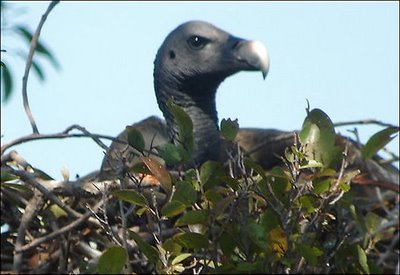

In this photo released by WCS Cambodia Program, an endangered slender-billed vulture sits in its net on a tree at the forest in Stung Treng province in Cambodia Wednesday, Jan. 17, 2007. Researchers working in the remote forests of Cambodia said Wednesday, Feb. 7, 2007 they have discovered the only known colony in Asia of Slender-billed vulture, which are considered one of the world's most threatened bird species. (AP Photo/WCS Program, HO)
By MICHAEL CASEY
The Associated Press
Wednesday, February 7, 2007; 8:33 AM
BANGKOK, Thailand -- Researchers in the remote forests of Cambodia said Wednesday they have discovered the only known colony in Southeast Asia of slender-billed vultures and scores of other endangered birds. The colony was discovered last month in the jungles east of the Mekong River in Cambodia's Stung Treng Province.
"We discovered the nests on top of a hill where two other vulture species were also found," said Song Chansocheat, manager of the Cambodia Vulture Conservation Project. The government project is supported by the World Conservation Society, BirdLife International, the World Wildlife Fund, the Disney Wildlife Conservation Fund and the Royal Society for the Protection of Birds.
"Amazingly, there were also a host of other globally threatened species of birds and primates," Song Chansocheat said in a statement. "It's a very special place."
The area was also found to be home to several other species listed as critically endangered by the World Conservation Union, including the white-rumped vulture, according to the New York-based WCS.
The team also spotted a red-headed vulture, giant ibis and an endangered primate called a silvered langur, or leaf monkey.
Researchers said slender-billed vultures have been found in other parts of Southeast Asia but that the only other known colony until now was in northern India. They are believed extinct in many parts of Southeast Asia, including Thailand.
Soon after the discovery, Song's team set up measures to protect against poaching and egg collecting, and are now working with local communities to ensure that they are involved in longer-term conservation measures.
"We already have a successful WCS model working in the northern plains where local people benefit from conservation activities," he said. "I think we have a good chance of making it work here if we can find the support."
The Slender-billed vulture is one of several vulture species in Asia that have been driven to the brink of extinction in the past 12 years after eating cattle carcasses tainted with diclofenac, an anti-inflammatory painkiller that's given to sick cows and is highly toxic to vultures.
Diclofenac has lead to global population declines as high as 99 percent in slender-billed and other vulture species, especially in India. Diclofenac is now being slowly phased out in South Asia, but not at a pace that assures the recovery of the vultures.
Because diclofenac is almost entirely absent from use in Cambodia, the WCS said the country remains one of the main hopes for the survival of the species. Even so, the birds face numerous other threats, including lack of food due to the over-hunting of large-bodied mammals, loss of habitat, and poaching.
___
On the Net:
The Wildlife Conservation Society: http://www.wcs.org/international/Asia/Cambodi a